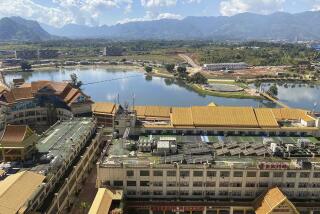Sri Lankan Military Raises Flag Over Rebel City
- Share via
COLOMBO, Sri Lanka — Government forces raised the Sri Lankan flag over the former Tamil rebel stronghold of Jaffna city on Tuesday, a turning point in the military’s 12-year-old war against separatist guerrillas.
The fall of Jaffna is unlikely to end the civil war that has killed more than 36,000 people, but it appears to mark the end of the rebels’ civil administration, a de facto government for about 1 million Tamils.
The flag was hoisted by the deputy defense minister, Lt. Col. Anuruddha Ratwatte, in a ceremony capping the military’s 50-day offensive that captured the city.
Rebels responded to the fall of their northern stronghold by ramming an explosive-laden truck into the gate of a police camp in an eastern Jaffna district. The truck failed to destroy the barrier, and the explosion killed the driver and wounded a guard, military officials said.
The Liberation Tigers of Tamil Eelam have been fighting since 1983 for a Tamil homeland in northern and eastern Sri Lanka, claiming the Sinhalese majority discriminates against them. Tamils make up 18% of Sri Lanka’s 17 million people.
The seven-week campaign was the military’s biggest offensive against the rebels. As soldiers closed in, most of the 120,000 civilians fled Jaffna city, which has been held by rebels for five years.
With the Tamil Tigers dislodged from their urban base, fighting is expected to increase in the jungles that cover most of the Jaffna peninsula and the northern mainland under rebel control. The rebels were making gains on the east coast, where the army diluted its strength to reinforce the troops in the northern offensive.
On the political front, the military victory could complicate President Chandrika Kumaratunga’s plan to decentralize power in the provinces and give more autonomy to the Tamils. Sinhalese conservatives argue that the rebel setback makes political concessions unnecessary.
More to Read
Sign up for Essential California
The most important California stories and recommendations in your inbox every morning.
You may occasionally receive promotional content from the Los Angeles Times.













